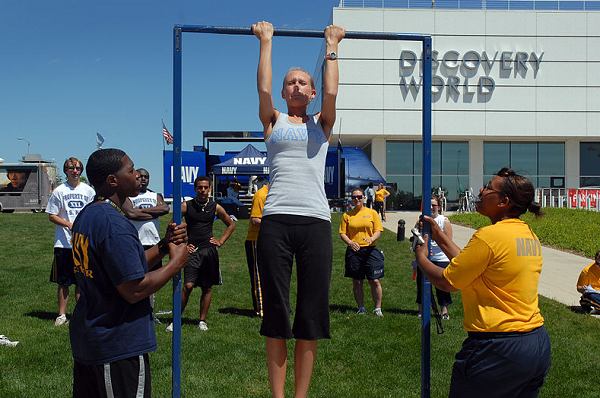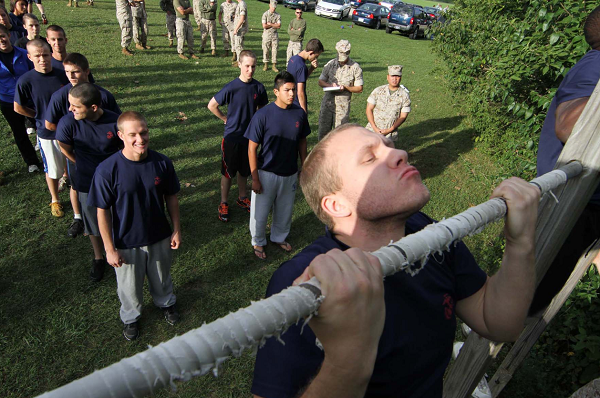

Recruits in the Delayed Entry Program will complete all of the enlistment steps but have a lapse in the time between when they sign their enlistment contract and when they ship to Basic Training.
The Delayed Entry Program (DEP) is used for a variety of reasons.
This article will cover what the Delayed Entry Program is, what to expect, how long it is, and what happens if you decide you want to get out of it.
Continue reading our complete Delayed Entry Program (DEP) guide for 2023.
Related Article – Your Complete Guide to MEPS
Table of Contents

The Delayed Entry Program (DEP) provides individuals the ability to join the Armed Services into a specific branch under an assigned MOS, AFSC, or Rating, but not leave for initial training right away.
Each branch of the Armed Services, including the Coast Guard, has a Delayed Entry Program.
The DEP is very common, as most individuals do not immediately ship out for training upon completing all entry requirements.
It is often thought of as only available to those who are still in school and are awaiting graduation prior to shipping out for Basic Training, but it is used by a large number of individuals for varying reasons.
Those in the DEP will attend MEPS and complete all entry testing/screening.
If you fail at MEPS, you cannot enter the DEP while you are awaiting retesting, but it is not required to have the results of all screenings back prior to entering into the DEP.
At times, individuals will actually enter into the DEP because they are waiting to meet some portion of the requirements such as meeting weight or security specifications.
When you enter into a DEP, you will be signing a contract that states you will report for active duty on a specific date and time.
You are making a commitment to a certain component of the Military when you sign that contract.
From the date you make that commitment until the date that you enlist, or after 365 days, whichever comes first, you are in the Ready Reserves.
Once you report for your assignment date, you are no longer considered in the Ready Reserves, but will be on active duty status and your service commitment starts at that time.
Activities completed in a DEP will differ based on which branch you join and which recruiting location you have.
All Delayed Entry Programs will require you to check in frequently with your recruiter, either in person or over the phone.
Other activities at DEP can include visiting nearby bases for a tour in addition to meet and greets with members.
DEP can include weekly meetings that act as a classroom for learning branch-specific information, including history, terminology, culture, and ethics.
You can even receive tests on this material and be required to study outside of your meetings.
In-person meetings can also include working out as a group at your recruiting location, or a location nearby.
Those not required to meet in person will be instructed to complete workouts in their own time.
The intention of the Delayed Entry Program is to establish an active duty report date and allow individuals time to prepare for their time in service.
It assists with recruiting measurements as your MOS, AFSC or Rating will already be chosen and accounted for once you reach your assignment date.
This time period can be very beneficial, and those benefits are discussed in the section below.
There are many benefits to joining the Delayed Entry Program.
It allows you to train for your position prior to attending branch-specific basic training.
Your ability to speak with and check in with your recruiter on a weekly basis allows you to seek guidance prior to shipping out.
You may join the Delayed Entry Program because you do not meet the qualifications.
This may mean that you are slightly overweight or underweight.
Joining the DEP for qualifications reasons may also mean that you are waiting for additional paperwork to be processed, such as citizenship verification or security clearances.
This is a benefit because it allows you additional time to meet that requirement, which may otherwise result in disqualification.
The DEP is available to those who are still in High School or may be finishing up the remainder of their college credits.
Using the DEP to sign up for the Military while still in school is beneficial because it ensures your position over others who will be joining once they complete school.
You can begin training and learning about Military customs and ethics prior to leaving for training.
DEP may also be one way of ensuring you get the MOS, Rate, or AFSC you want. If you have your heart on a particular career, you may be able to use DEP to ensure you get that position.
Some highly-sought military career fields may not be available to you if you ship immediately. In many cases, you can reserve that job through DEP and then ship when an opening is available.

Your time in the Delayed Entry Program can be used to learn terminology, find out what to expect, and visit different bases.
Each branch has different tools and resources that will be provided to you while in the DEP.
The Air Force has an application that you can put onto your phone to assist with your transition from civilian to Military life while in DEP.
The application is called the USAF Delayed Entry Program and it is available on both Android and Apple products.
It provides packing list information, fitness, nutrition, and drills.
The app also has information on reporting statements and quizzes with flashcards to become familiar with USAF information.
The Navy has a “Start Guide” that is provided to recruits who join the DEP.
This guide includes information on what to expect, etiquette, physical readiness, code of ethics, Navy terms, Rank information, and more.
A copy of the guide can be found here.
The Marines and Army require their Poolees and Future Soldiers, respectively, to meet with their recruiter routinely.
This benefit allows recruits to ensure they have all of the information they need to feel confident when they meet their shipment deadline.
During these meetings, resources are often provided on terminology, what to expect during training, how to prepare, and what to pack.
Related Article – Marine OCS Guide
Regardless of your initial training path, a large emphasis will be placed on meeting the physical fitness requirements for your branch of service.
A benefit of being in the Delayed Entry Program is the ability to receive training advice from your recruiter.
While you can find workouts and information from many different resources, hearing what type of physical activities you will be put up against in Basic Training from someone who has been there, is completely different.
The length of the Delayed Entry Program varies from person to person.
It can be as short as two months and continue for up to one year.
After one year, you are considered discharged from the reserve component.
There are instances where a waiver can be signed to extend the wait past one year, but those instances are very rare.
DEP length is factored based on when your job/specialty is available, when you finish school, or when you meet qualifications.
The Delayed Entry Program is not technically an active or reserve program.
Until you sign your contract and attend basic training, you do not generate Military pay or receive Military benefits.
Some DEP Programs will pay for certain items.
An example of this is when Army personnel in the Future Soldiers Program attend outings together and travel is accommodated for the individuals in the program.

There can be misinformation related to leaving the Delayed Entry Program.
Even though you have not shipped to Basic, Initial training, OCS, or wherever your first training location may be, you still made a legally binding commitment.
Although it is very unlikely that legal action will be taken against you if you do not show up for your scheduled departure date, it is still possible.
The time in the Delayed Entry Program does not count towards Military service until you sign and begin your active duty contract.
To leave the DEP, you must follow the Department of Defense Instruction 1332.14 which states that you have the right to leave if you do not meet enlistment standards.
Under this Instruction, you should send a letter to the Secretary of the Department you are joining, stating that you do not meet enlistment standards and wish to be released.
Enlistment standards could be for a variety of reasons including hardship, wanting to attend college, or a misunderstanding of your enlistment details.
It is best to be as informational as possible in this request.
When this is granted, it is called an entry-level separation.
Although you are separating early, the separation is not considered as a dishonorable discharge, or any other type of discharge.
It will not result in a Reenlistment Eligibility Code that would ban you from joining again.
As discussed in a previous section, after 365 days you are discharged from your Ready Reserve status and that is considered another way to leave the DEP.
You still have a chance to enlist again in the future but it may require a waiver to join into that same branch.
Be prepared for your recruiter to try to entice you into not leaving, because, after all, they put a lot of time and effort into enlisting you.
The Recruiting Commanders may also try to entice you, but cannot threaten you.
If you are in the Delayed Entry Program and wish to join another branch of service, you must first submit a request to exit the Delayed Entry Program of the service you are in.
So, while you can enter into another branch, there is not currently a process to switch to another service.
The easiest way to complete this process is to be upfront with both the recruiter that you have been working with and the new recruiter.
The recruiter from the branch that you would like to switch to can help you submit your request to separate from the branch you are currently enrolled in the DEP with.
Your separation request reason is that you would like to join a different branch of service.
Submitting the separation request should not delay your entry into your new service for any extended period of time.
Once your request is signed, you can complete the process to enlist with a new branch.
Some of your information from MEPS may transfer to your new service, although you may be likely to attend MEPS again in order to ensure you meet specifications related to your new branch of service.
The best way to prepare for the Delayed Entry Program is to get into shape.
A large portion of DEP mentoring involves getting into physical shape in preparation for entry training.
Some branches will have weekly meetings that involve a workout or provide a training plan for you to do at home.
Other branches may not physically meet each week but will provide you with information on what kinds of physical tests you need to be prepared for once you reach training.
Another way to prepare is to start to become familiar with your branch.
Once you are in the DEP, your recruiter can provide you with branch-specific information.
It is good to become familiar with the command structure, your future training location, the job functions of your job, and overall what you can expect during service.
You should also prepare by becoming familiar with the expectations of your branch during your time in the DEP.
Your specific recruiting station may ask that you report to them in person 1-2 times a week.
This can have an impact on a work schedule or other commitments that you are taking part in.

The Delayed Entry Program is a beneficial opportunity for those who are waiting for their assigned active duty report date.
Individuals in the Delayed Entry Program are considered in the Ready Reserves and will touch base with their recruiter weekly.
This program has a heavy emphasis on becoming physically and mentally prepared for the challenges ahead.
DEP is available for up to one year once the contract is signed.
It is a legally binding contract, but you can work with your recruiter on removing yourself from service or switching to another branch.
Related Article – Navy Sea Cadet Program
Nick Anderson has been serving on Active Duty in the U.S. Navy for the last 10 years. He graduated from Saint Leo University with his B.A. in Accounting and is a graduate student at the University of Louisiana at Lafayette, pursuing an M.B.A. in Finance. Born and raised in Huntsville, Alabama, Nick enlisted in the Navy at the age of 17. During his deployments onboard the USS Fort McHenry, he traveled to 23 countries on four continents, sailing roughly 42,000 nautical miles across 30 seas and five oceans. He currently resides in Meridian, Mississippi.
Latest posts by Nicholas A. (see all)
Learn more about the Delayed Entry Program, or DEP, including what it is, the benefits and qualifications, and the entry process for each branch of the military.
Originally posted on March 20, 2022 @ 7:51 pm
Affiliate Disclosure: This post may contain affiliate links. If you click and purchase, I may receive a small commission at no extra cost to you. I only recommend products I have personally vetted. Learn more.
Share on Facebook Tweet on twitter Share on google+ Pin to pinterestOperation Military Kids was founded to be a resource for teens and young adults who are interested in joining the military, but don't know where to begin.
We employ a wide variety of writers who have actually served in every branch of the military, giving you a unique perspective on what you can expect when joining.
Click Here to learn more about our mission.